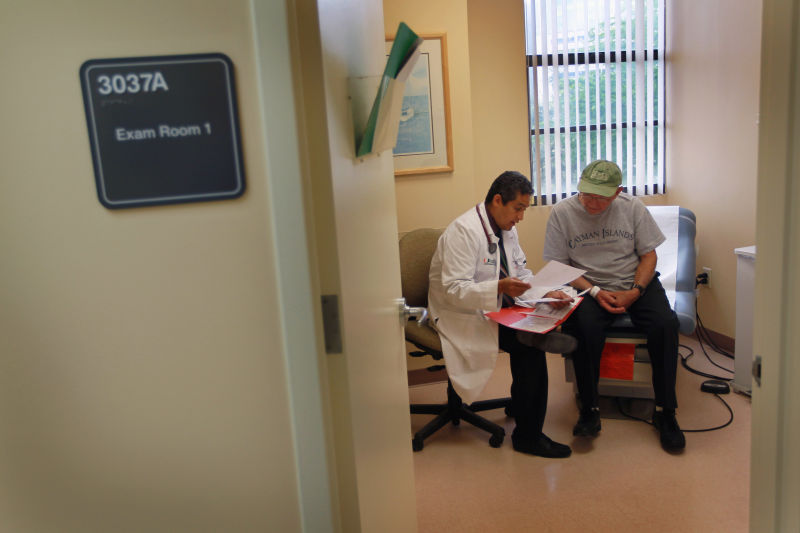"When there's an emergency, I go to a clinic," she says. "And each time it costs me $45. We need medical coverage, so we don't have to pay so much. That's why we're fighting for it."
Arriaga used to have health insurance through her work, but now that she's unemployed she says she relies more on over-the-counter remedies.
Gerald Kominski, director of the UCLA Center for Health Policy Research, says that's a typical solution for this population. "When people are uninsured they just postpone care-seeking until it's absolutely necessary, and then it's much more costly."
Those working for the Contra Costa program are busy setting up systems to track these new patients.
Potential Savings ... or Costs?
Álvaro Fuentes is director of the county's Community Clinic Consortium, which will provide the medical homes for these new patients. He says they hope to show county officials a year from now that preventive care can save money.
"If we can start with this small set of individuals and are able to start documenting and in some cases capture the cost savings to the health system, it may promote and motivate additional funding," Fuentes says.
But county Supervisor Candace Andersen is not convinced. She voted against the program, which is expected to cost $1 million and is being paid for by the county and by area hospitals.
"This is a one-year pilot program," Andersen says, "and there's no reliable funding source identified to make sure it's an ongoing program."
Contra Costa County used to provide health care coverage to undocumented adults, but cut its program during the 2009 recession. This move is a small step toward bringing it back.
Gabrielle Lessard, a health policy attorney with the National Immigration Law Center, says the task now is a bit less daunting, because so many more people are insured under the Affordable Care Act.
"Now that the number has been whittled down to a more reasonable level, it's something the counties can see tackling," Lessard says. "They understand when one person in a household doesn't have health insurance, the entire family is one illness or injury away from financial disaster."
Statewide Support for Coverage
And an increasing number of California voters seem to support tackling the issue. Fifty-eight percent of the state's voters, according to a recent Field Poll, believe undocumented people should be eligible for Medi-Cal or a similar program.
Anthony Wright is executive director of Health Access, a statewide advocacy group. He believes there is momentum -- both policy and political -- to extend Medi-Cal to all the state's undocumented residents. He notes that 48 of California's 58 counties are now on board to provide some sort of limited low-cost or free health benefits to the undocumented.
"We see the actions by Contra Costa, as well as other counties like Monterey and Sacramento, as county bridges to a statewide solution," he says.
Wright and his allies recently won a big victory when the state agreed to expand Medi-Cal to cover all undocumented children, beginning next spring. That legislation had included insurance for all undocumented people regardless of age, but was pared down because of cost.
Expense isn't the only issue for Ira Mehlman, with the Federation for American Immigration Reform, which advocates for stricter immigration policies, including in California.
"California for a long time has been moving in the direction of accommodating illegal immigration, bending over backwards to provide new services and benefits to people in the country illegally," he says.
Mehlman says other states are watching what's happening in California -- but, he says, it's a limited number of them.
"If you look at the pattern over the past several years," he says, "it is pretty much the same states that are doing things that are similar to what California is doing."
He's referring to other blue states -- like Washington, Illinois, Massachusetts and New York -- that already provide health coverage to undocumented children. The District of Columbia provides all its residents with public insurance, regardless of their immigration status.
Then there's California, with the largest undocumented population in the nation, at 2.5 million. Immigration law advocate Lessard says that makes the Golden State a kind of incubator.
"Advocacy is going to continue," she says. "It will probably be a multi-year effort, but I think eventually people will come to terms with the fact that everyone is just better off when we all have access to care."
That advocacy will be felt again in Sacramento next year. A two-year bill that was introduced last December would provide public health insurance to low-income people living here illegally. And the bill, SB10, requests a federal waiver so those with more income can purchase private insurance through the state's health exchange.
